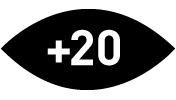

Hollywood didn't really hit upon the idea of making Thanksgiving movies until the late 1980s. Prior to that, unless you count The Last Waltz and Alice's Restaurant, most movies set on or around Turkey Day were more about Christmas. Even Miracle on 35th Street, set at Macy's during preparations for the Thanksgiving parade, is more of a Christmas picture. But in January of 1984, Woody Allen released Broadway Danny Rose, which culminates on Thanksgiving and has always felt like a very Thanksgiving-y movie to me. It is one of my 100 favorite films, and I often run it on Thanksgiving Eve, especially when I have friends in town who've never seen it.
Woody Allen's run of movies in the 1980s was unlike any other filmmaker in all of cinema. After coming up as a stand-up comedian, TV variety show writer, and talk show staple, he made a uniquely successful jump in the late 1960s to playwright and then to writer and director of feature films. Most of these he also starred in with his former girlfriend, Dianne Keaton, culminating in their 1977 Oscar-winning hit Annie Hall. After a few stumbles (at least as far as critics were concerned), he hit the 1980s running, cranking out one good-to-great film every year, most of which starred him and/or his new on and off-screen partner, Mia Farrow. Broadway Danny Rose may not be one of the greatest Woody Allen movies ever made, but it is certainly one of my favorites. Released during Woody's golden period, this delightful picture marked a time when the collaboration between Woody and Mia was at its peak, long before their names would be forever associated with abuse and scandal. The third of the fourteen films they made together is a love letter to Allen's comedy roots and an ideal lead role for his nebbishy screen persona, but the project was initiated to create a part for Farrow that was completely different than any she'd played before. As the story goes, Allen and Farrow were having dinner one night in an uptown Italian restaurant where they were impressed with its proprietor, who wore her hair in a towering bouffant, never took off her sunglasses, chain-smoked, and yelled at the staff and customers with a thick Jearsy Shore accent. Farrow sighed and said, "I never get cast as a woman like that. It would be so fun to play someone like her."
Indeed, the former flower child, former wife of high-powered husbands Frank Sinatra and André Previn, and daughter of egocentric director John Farrow and imposing actress Maureen O'Sullivan, had been limited to two screen personas for her entire career. She was either cast as a fragile, almost waif-like innocent, as in Rosemary's Baby, Secret Ceremony, and A Wedding, or an idolized depiction of upper-class femininity, as in The Great Gatsby, Follow Me!, and her first film with Allen, A Midsummer Night's Sex Comedy. The tough-talking, hard-edged ballbuster Tina in Broadway Danny Rose proved that Farrow had tremendous untapped range as an actress. It is my favorite of her many film performances. But this film is not just a showcase for one great actor; it's a most unusual three-hander.
Allen plays the titular Danny Rose, a theatrical manager who represents acts that exist on the lowest rung of the Show Biz ladder. His roster of entirely unsuccessful entertainers includes a blind Xylophone player and a one-legged tap dancer. Danny is totally devoted to his clients, booking them onto any stage available for any amount of money he can get, even if it means forgoing his commission. He's a looser but a devoted, loyal, lovable looser, loosely based on the early career of Allen's own manager, Jack Rollins. The movie is brilliantly structured as a series of anecdotes told by a bunch of old-school New York show biz types over lunch at New York's Carnegie Deli. Played by real-life entertainers, directors, and managers, this Greek Chorus of Borscht Belt schnorrers swap stories about the hapless Danny until one of them, comedian Sandy Barron, claims to have the ultimate Danny Rose story and begins to regal the assembled group with "the one with Lou Canova." The bulk of this film's 84-minute running time—only two of Woody's eleven '80s movies ran over 88 minutes, which is one of the many reasons they're so endlessly rewatchable—is taken up with this story.
In Barron's tale, we learn of Danny's one client who had somewhat of an actual career, a washed-up, overweight, boozy, philandering lounge lizard named Lou Canova. Danny thinks this one-hit-wonder Italian crooner is about to have a career rebound due to a nostalgia craze for everything 1950s. Lou might be the one act he can guide to success and come along for the ride, though every other client he ever had who got even close to the big time has dropped Danny like a hot potato knish, opting for more professional representation. Danny has landed a major gig for Lou at the Waldorf Astoria, where he will perform in front of Milton Berle. But the married Lou doesn't want to perform unless the woman he's been having an affair with, Tina Vitale, can be there. At Lou's insistence, the put-upon Danny agrees to act as a "beard," pretending to be Tina's boyfriend so she can come to the show without Lou's wife getting suspicious. But when Danny goes to pick up Tina, he finds she's furious at the two-timing Lou and refuses to go to his concert. The exasperated Danny is then swept into a life-and-death adventure with Tina as they must deal with Tina's ex-boyfriend, who is under the impression that Danny is her new beau, as well as his vengeful Mafia mother who sets her two dimwitted hitmen sons after them. The long afternoon and evening this mismatched couple spend on the run together is hilariously scripted and beautifully paced.
In addition to Danny being arguably Allen's most likable character and Tina being Farrow's most unique performance, this small cast's third member is equally important and delivers just as wonderful a comic turn. By all accounts, Allen had written the role of Lou thinking about Sylvester Stallone, who had a non-speaking role as a subway mugger in Woody's early movie Bananas. But the part of Lue ended up going to the virtually unknown Nick Apollo Forte, a real-life overweight Italian crooner and songwriter. Forte's career so closely mirrors that of Lou Canova that it seems almost impossible that Allen did not write this role for him. However, the character was completely invented out of the desire to create a story around the role Woody was writing for Farrow. The stalwart casting director, Juliet Taylor (or someone in her office), discovered one of Forte's albums in a used record store on Broadway. Not only does he look and sound perfect for this role, but Forte's original songs "My Bambina" and "Agita" are an astoundingly good fit for this picture. I don't think the greatest songwriter in the world could have written a cheesy Italian love ballad and a pseudo-'50s novelty song that are as perfect as these actual tunes. They are both utterly credible and, when it comes down to it, pretty great songs. I love hearing these tunes over and over, especially when filtered through music director Dick Hyman's ingenious orchestrations, which give the Neapolitan ditties a distinctly Yiddish interpretation. This was the only movie Nick Apollo Forte ever made. Somewhat like his character, he didn't seem to have been able to parley this small success into a career boost, even though, for my money, he's second only to Harry Dean Stanton in Repo Man as 1984's Best Supporting Actor.
The movie oozes authenticity. Allen came up in the world he depicts here, and he not only knew it well but knew all the characters who populated it (some were still populating it when he shot the picture). It's also a hilarious fish-out-of-water and culture-clash comedy, with the hyper-Jewish Danny Rose suddenly finding himself immersed in an ultra-Italian Catholic environment. The way this movie trades in broad but harmless ethnic stereotypes is perfectly in line with the Borsht Belt style of comedy it's paying homage to. With its zany sight-gags, hilarious one-liners, and simple, poignant story, Broadway Danny Rose harkens back to the director's "early funny" movies like Bananas and Love and Death while still retaining the elegance and depth of his late-'70s and '80s work. The breathtaking Black and White cinematography by the legendary Gordon Willis (The Godfather, All the President's Men, and all of Allen's films from Annie Hall to The Purple Rose of Cairo) not only captures the vague some-time-in-the-not-too-distant-past period; it provides this small, seemingly slight film with elegance and gravitas. There are two surrealist shots and magical cuts in this movie that literally stop my heart more than Allen's homages to Ingmar Bergman and Federico Fellini in his more serious films like Interiors and Stardust Memories. By this point, the director was able to take much of the cinematic language he'd learned from his European new-wave idols and apply it to his own lighthearted comedies without coming off as ineffectual or pretentious.
The theme of Broadway Danny Rose is summed up by Danny's uncle's philosophy of life, "acceptance, forgiveness, and love," which he explains to Tina only to be shut down by her infinitely harsher worldview. But this credo is what makes this somewhat melancholy comedy Allen's most optimistic and humanist work—it's also why I think this is ultimately such a good Thanksgiving picture. Danny (like Woody) is an atheist, but (unlike Woody) he feels guilty about it. Danny believes in guilt and its important role in developing a strong moral compass, and he always tries to do right by the people he crosses paths with, even though they don't always do right by him.
Though on the surface, Danny feels like a quintessentially Woody character, he's actually quite a bit more layered than the typical Woody or Woody surrogate found in most Allen films. He's a one-of-a-kind character, and this is a one-of-a-kind movie. I can think of no other film quite like it, though I'm pretty sure it's the first example of a romcom that ends with an extended shot of one of the characters running after the other. In this case, it's not to stop them from getting on a plane, marrying the wrong guy, or taking a job in another city; it's just to offer simple forgiveness. It's one of my all-time favorite movie endings—all done wordlessly with a wonderful instrumental of Nick Apollo Forte's romantic song, Gordon Willis's incredible photography, and an amazing location—New York's iconic Carnegie Deli. I was a devotee of the Carnegie even before I lived in Manhattan. The place may not have served the best sandwich in town or provided the most comfortable ambiance, but it had so much character. I even shot my own little movie there once when I was in film school, and I mourned the day it closed for good as much as I did when we lost its neighbor, the magnificent Ziegfeld cinema. But as this picture makes clear, some of the best things in life only live on in the stories we tell (and in movies).
Woody Allen plays his most lovable character, Mia Farrow gives her most unexpected performance, and first-time/last-time actor Nick Apollo Forte steals the show in Allen's most heartfelt and least cynical picture—for me, the original Thanksgiving movie.









